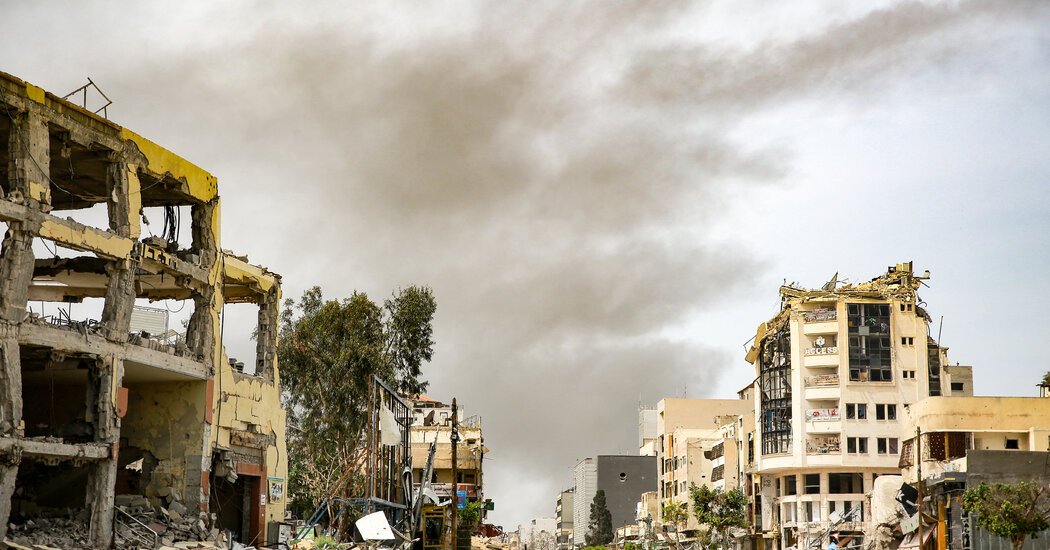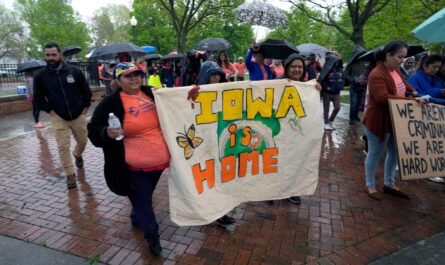Israeli troops and Hamas fighters waged deadly battles in and around two of the Gaza Strip’s major hospitals on Thursday as the Israeli government came under growing pressure at home and abroad to moderate its approach to a war that has devastated the enclave.
Fighting raged for the 11th day at Al-Shifa Hospital in Gaza City in an area Israeli forces first seized in November. The clashes illustrated the difficulty the Israelis are having in keeping control of places they had already taken as Palestinian militants melt away and then return.
In Israel, Prime Minister Benjamin Netanyahu, increasingly unpopular and facing criticism on multiple fronts, met for the first time with the families of kidnapped soldiers being held in Gaza, who accused him before the meeting of ignoring their plight for nearly six months. The soldiers’ relatives had largely remained silent in public while other families of captives spoke out, many of them saying the prime minister should agree to a truce with Hamas if that was what it would take to free their relatives.
But there has been no apparent change in Israel’s determination to press on with its offensive in Gaza, despite pressure from, among others, hostage families, the Biden administration and the United Nations, where the Security Council passed a resolution on Monday demanding a cease-fire. After vetoing previous cease-fire resolutions, the United States abstained on Monday, allowing the measure to pass and signaling American displeasure over Israel’s conduct of the war.
The International Court of Justice in The Hague on Thursday ordered Israel to take concrete steps to ensure that humanitarian aid reaches Gaza as starvation spreads there, calling on Israel to cooperate with the United Nations and increase the number of crossing points for aid. The ruling contained the strongest language the court has used so far as it weighs a case filed by South Africa that accuses Israel of genocide, which Israel denies.
“Catastrophic living conditions of the Palestinians in the Gaza Strip have deteriorated further,” the court said.
Mr. Netanyahu and the far-right members of his coalition insist that Israel must continue its brutal aerial bombardment and ground offensive — including a planned invasion in Rafah, the southern city where most of Gaza’s population has sought refuge — to destroy Hamas as a fighting force and win the hostages’ freedom.
“Only the continuation of the forceful military pressure we’ve exerted and will continue exerting” will free the captives, Mr. Netanyahu told the relatives of captive soldiers as their meeting began. He added, “We’re bracing to enter Rafah.”
Some of the family members asked at a news conference before the meeting why the prime minister had met multiple times with the families of other hostages but not with those of the soldiers. Almost half of the more than 250 people seized during the Oct. 7 Hamas-led assault on Israel have been released, and many of those who remain — how many is unclear — are soldiers.
“Our sons were abandoned,” said Anat Engerst, whose son Matan is one of the kidnapped troops. Five female soldiers are also being held by Hamas.
Mr. Netanyahu, angered by the passage of the U.N. resolution, responded by canceling a planned trip to Washington by top Israeli officials that President Biden had requested to discuss alternatives to an incursion into Rafah. On Thursday, a White House spokesman, John F. Kirby, told reporters that the administration was working with the Israeli government to reschedule the meeting, which Israel has not confirmed.
On Thursday, Mr. Netanyahu told captive soldiers’ families, “We conquered the strip’s north as well as Khan Younis,” but even as he spoke, there was fierce fighting underway in both areas.
Military strategists and Western officials have not only called the Israeli conduct of the war unjustifiably destructive and deadly, they have also questioned its effectiveness. Hamas and other Palestinian armed groups conducted more than 70 attacks targeting Israeli forces in and around Al-Shifa Hospital since the latest Israeli raid there began on March 18, according to an analysis by the Institute for the Study of War, a research group in Washington.
“This high rate of attack indicates that Palestinian militias retain a significant degree of combat effectiveness in the area, despite continued Israeli clearing efforts around Gaza City,” according to the analysis, which did not elaborate on the nature of each attack.
Israel has withdrawn most of its forces from the north and is relying there on periodic raids that will go on for months, said Yaakov Amidror, a retired major general who served as national security adviser to Mr. Netanyahu in an earlier government. He described the operations as “mopping up” and “cleaning up the area.”
The Israeli war effort in Gaza has faced rising condemnation around the world; U.S. public opinion, mostly favorable to Israel’s actions after the Oct. 7 attack, has turned sharply against it.
The war has killed more than 32,000 people, according to the Gazan Health Ministry, with many more missing and feared dead under the rubble. It has displaced most of the enclave’s 2.2 million people from their homes and destroyed or damaged much of its infrastructure. Too little food and other necessities are reaching Gazans, and the United Nations has warned of impending famine; relief groups blame Israel for restricting the supply, and Israel places the blame on disorganization by those groups and diversions by Hamas.
The Israeli military said in a statement on Thursday that it had killed nearly 200 people whom it called terrorists in the fighting at or near Al-Shifa, Gaza’s largest hospital, and that its troops had taken fire from militants inside and around one of the hospital’s buildings. Gazan authorities said that over the course of the raid, more than 200 civilians were killed and another 1,000 were detained. Neither claim could be independently verified.
Witnesses have described days and nights of terror at Al-Shifa, where many civilians went to escape fighting and bombardment in their neighborhoods, with several patients dying.
“We are constantly hearing strikes and gunfire day and night and seeing smoke rising from buildings,” said Ezzeldine al-Dali, who lives less than a mile from Al-Shifa. He said that Israeli forces set several homes in the area on fire after their occupants evacuated. That claim could not be independently verified.
“The scale of destruction around us is indescribable,” said Mr. al-Dali, 22, in a voice message on Thursday. “The homes that have not been reduced to rubble have been burned,” he added.
In the southern city of Khan Younis, fighting has raged all week in and around Al-Amal Hospital, which went out of service on Monday night after Israeli forces besieged it, forced everyone inside to leave and then used bulldozers to seal off its entrances with earthen berms, according to the Palestine Red Crescent Society, which runs the hospital.
Most of Gaza’s hospitals no longer function as hospitals, and those that do are critically short of supplies and staff. “The loss of Al-Amal is another blow to an already collapsing health system,” the International Committee of the Red Cross said on Thursday.
Reporting was contributed by Matthew Mpoke Bigg, Johnatan Reiss, Richard Pérez-Peña and Katie Rogers.




